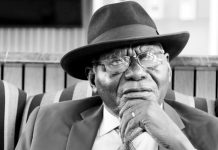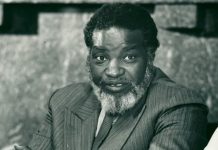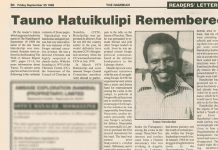By Tileni Mongudhi | 20 August 2014
Law Reform and Development Commission chairman Sacky Shanghala’s credibility and impartiality is being questioned now that it has become clear that he stands to directly benefit from the Constitutional amendments he is championing.
Shanghala is vying for a seat in parliament for Swapo and would stand a better chance of going to the National Assembly when the number of seats are increased from the current 78 seats to 104.
People close to Shanghala say he covets the position of Attorney General and that probable future president of the country Hage Geingob would give it to him or the justice minister portfolio.
Geingob has not officially pronounced himself on who will be on his list of eight people, if he is elected state President.
Shanghala’s nomination has got his detractors screaming ‘conflict of interest’ and accusing him of being motivated by self interest in pushing for the Constitutional changes.
The legality of the Law Reform and Development Commission is also in question because the composition is not as the law requires. The commission’s term ended in November last year and none of the vacancies have since been filled.
The Namibian has also learned that the commission did not discuss nor handle the wholesale changes to the Namibian Constitution before its term expired last year.
Shanghala did not respond to questions put to him two days ago.
In 2009 Swapo candidate and former State House employee Monica Nashandi resigned from her job after she was nominated to the party’s parliamentary list by President Hifikepunye Pohamba while the University of Namibia also instructed Swanu president Usutuaije Maamberua to resign the minute he was nominated by the party.
In an email, former member of the Law Reform and Development Commission Dianne Hubbard pointed out that the proposal of the Constitutional Amendments without the intervention of a proper commission is beside the law.
She said the LRDC is a statutory body with a composition set by law and it is designed to have diverse points of view from different sectors of the legal profession which includes the Minister of Justice, the Law Society and the University of Namibia’s Law Faculty.
“The vacant seats of the commission should be filled as prescribed and willful failure to do so is contrary to the clear intention of the law,” said Hubbard.
She pointed out that the proposed Constitutional Amendments did not have to emanate from the LRDC.
“The Constitution is a supreme law and one of the Namibia’s strengths was adopting it by consensus back in 1990. It is best to ensure that the amendments are similarly a product of consensus and that there is a sense of transparency and openness so that the public feels consulted and listened to,” said Hubbard, who has worked for the Legal Assistance Centre for over two decades.
According to her, the LRDC was not properly constituted when the Constitutional Amendments were made and Shanghala seems to have been working primarily as an individual on this.
Shanghala has always operated in grey areas, being a civil servant, a politician and a businessman.
Before his appointment as LRDC chairman, he was special advisor to the then justice minister Pendukeni Iivula-Ithana.
Despite him having been a political appointee, Shanghala was in the thick of things writing legal advice to ministries and government agencies.
In 2010 The Namibian inquired about Shanghala’s position, limitations and whether a political office bearer was allowed to do work that professionals in the ministry, with the Office of the Attorney General, were already carrying out. No response or clarification was ever given.
At the time questions were also being asked as to how he was allowed to write a policy that affected the government’s catering contracts while he owned a catering business.
The 37-year-old Shanghala is considered a veteran in some political circles. He was brought into government and politics by Prime Minister Hage Geingob in 1999 when he was only 22 years old.
The young Shanghala worked as Geingob’s chief of staff. Two years later Shanghala became special advisor to the Attorney General.
His many hats have always raised intrigue. At age 32, Shanghala and his business partners made headlines when his business connections entered the public arena, in particular a short-lived but hugely profitable oil deal in 2004.
Shanghala and his business partners set up a company widely known as Namibia Liquid Fuel (NLF).
The company emphasised its black-ownership credentials when entering a joint venture with South African fuel major Sasol for oil importation on behalf of NamCor, the state-owned business that holds the right to import 50% of Namibia’s fuel requirements.
The deal earned the Namibian group of six more than N$55 million over three years. But they were heavily criticised over the manner in which the tender was acquired and for showing little interest in learning or imparting the necessary business skills while busy drawing profits.






